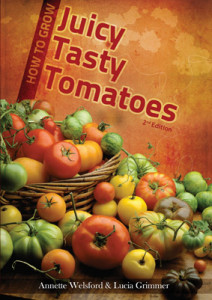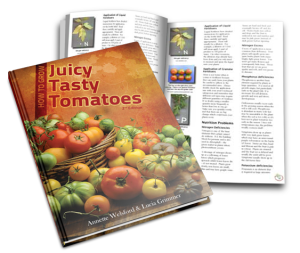Description
How to Grow Tomatoes. Did you know that people grow tomatoes more than any other vegetable? (Well technically it’s a fruit, but most people think of it as a vegetable!) And with over 11,000 varieties to choose from – you’re bound to have your own favourites.

There’s the tiny cherry varieties – like the sweet little Tommy Toe right through to the huge beefsteak varieties like Black Krim with charcoal coloured flesh. Some varieties have real ‘bite’ and others are deliciously sweet. The tasty Black Russian is very juicy and packed with flavour. The Tigerella has gorgeous striped red fruit and contrasts well in a salad with the Beams Yellow Pear. How to Grow Tomatoes
Once you have tasted the delicious flavour of home grown vine ripened tomatoes it is difficult to return to buying the supermarket varieties. However growing healthy juicy tomatoes with lots of flavour is not always easy. . . There are all sorts of things which can go wrong and destroy the plants and fruit before you get to taste the first one. How to Grow Tomatoes

Professional growers don’t leave it to chance – they get expert help, so they have the very best scientific information. Australian expert Lucia Grimmer has been helping professional growers for years – and now she shares her knowledge with home growers. How to Grow Tomatoes
The following information is derived from her book “How to Grow Juicy Tasty Tomatoes” which she developed with co-author and publisher Annette Welsford. The book provides step-by-step advice and tips on how to grow tomatoes which you can use to help you substantially increase your crop’s health and yield. Not only that – your tomatoes will have more flavour and be a lot sweeter than you’ve tasted from any store bought variety. How to Grow Tomatoes
Applying the correct fertilizer combinations at each growth stage is crucial to maximising yield and producing tasty tomatoes. Many people assume that because the soil contains organic matter that this is enough. It isn’t! Compost or granular fertilizers take time to break down, so your plants could be starving and will need supplementing – particularly when beginning to flower. There are 3 major nutrients (nitrogen, phosphorous and potassium) that the plants need, and they need them in different ratios during their life cycle. For example, too much nitrogen from fruit set onwards will result in fruit cells that are thin and soft, prone to disease and lacking in flavour. Your plants may also need other types of trace elements, including calcium, zinc, magnesium and boron, depending on your soil health . (See pages 41 -46 for in-depth advice and help with providing the right nutrition to your tomato plants, including how to recognise and correct nutrition excesses or deficiencies.)
Tomato Diseases



Verticillium wilt
Photo: Courtesy Queen’s Printer for Ontario
Botrytis
Courtesy T Zitter, Cornell University,
Ithaca, NY Fusarium wilt
Photo: Courtesy
Randy Gardner,
North Carolina State University
Tomatoes can be seriously affected by pests and diseases, particularly in warm wet climates. It doesn’t take long to lose a crop from pest or disease issues, so you need to regularly check your plants for symptoms and control quickly. Common diseases include Wilts, Leaf Spots, Blight, Mildew, Canker, Black Rot, Root Rot, Fruit Rot, Viruses and Nematodes. How to Grow Tomatoes.

Pests are the bane of tomato growers – particularly in hot humid areas. It’s important to keep the tomato patch free of weeds and debris and to control pests quickly. Common pest include aphids, thrips, cutworm, bollworm, whitefly, sting bugs, spider mite, fruit fly, slugs, snails, nematodes and birds.

Sometimes the plant or fruit exhibit issues which are not caused by disease or pests, but still affect the quality of the fruit. Common issues include catfacing, blossom end rot, sun scald, blossom drop, fruit drop, leaf roll and fruit crack.







Reviews
There are no reviews yet.